
Amar Singh Thapa distinguished as Badakaji Amar Singh Thapa(Nepali: बडाकाजी अमर सिंह थापा), or Amar Singh Thapa The Elder, also known by the honorific name Bada Kaji or Budha Kaji, was the overall commander of the Nepal Army in the conquest of Western Provinces and authoritative ruler of Kumaon, Garhwal and its West in the Kingdom of Nepal. He was referred by the King of Nepal to have been deployed as Mukhtiyar of Western Provinces of Kumaon, Garhwal and its West. He is often hailed as Living Lion of Nepal and was posthumously regarded as one of the national heroes of Nepal, who led the Anglo-Nepalese War for the Gorkhali Army.
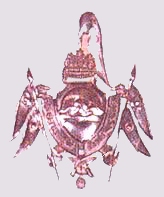
Rana dynasty is a Kshatriya (Rajput-Chhetri) dynasty from the Indian subcontinent that ruled the Kingdom of Nepal from 1846 A.D until 1951 A.D, reducing the Shah monarch to a figurehead and making Prime Minister and other government positions hereditary. Rana dynasty is historically known for the iron-fisted rule. This changed after the Revolution of 1951 with the promulgation of a new constitution, when power shifted back to the monarchy of King Tribhuvan.
Dil Bahadur Lama, popularly known as DB Lama was a leader of Nepali Congress (Democratic) and former Inspector General of Nepal Police. He was elected to the Pratinidhi Sabha in the 1999 election on behalf of the Nepali Congress. In 2001, he was included as an Assistant Minister of General Administration in Sher Bahadur Deuba's expanded cabinet. In that cabinet he served under Minister of General Administration Khem Raj Bhatt Mayalu. After the 2006 uprising against monarchy in Nepal, Lama was included in a Parliamentary Sub-Committee, organized to investigate the assets of the king.

Lakhan Thapa Magar (1835–1877) was a Nepali revolutionary whom Nepal government has declared "The First Martyr of Nepal" He was the first revolutionary leader who, for the first time in history, resisted the government in Nepal namely: the rule of the Rana dynasty 1846 - 1950. He rebelled against the tyranny of Jang Bahadur Rana. He was supported by his close friend Jay Singh Chumi Magar. Jaya Singh Chumi was his minister. He propagandized his political ideology to destroy the Jung Bahadur Rana regime, to form a free state and army.

Damodar Pande was the Mulkazi of Nepal from 1803 to 1804 and most influential Kaji since 1794 to his death on March 13, 1804. He was the youngest son of famous Kaji of Prithivi Narayan Shah Kalu Pande. He was born in 1752 in Gorkha. Damodar Pande was one of the commanders during the Sino-Nepalese War and in Nepal-Tibet War. And he was among successful Gorkhali warriors sent towards the east by Prithivinarayan Shah.
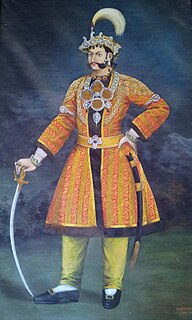
Mathabar Singh Thapalisten (help·info), also spelled Mathbar, Mathawar, Mathavar, variantly called Matabar Singh Thapa, was the Prime Minister of Nepal and the Commander-In-Chief of the Nepalese Army from 1843 December 25 – 1845 May 17, until he was murdered by his nephew Jung Bahadur Rana. He was the first Mukhtiyar to title himself as a Prime Minister, as per the British convention. He was the nephew of Bhimsen Thapa, who was falsely sentenced for imprisonment for the death of King Rajendra's six months old son. Mathabar Singh Thapa fled to Shimla after the execution of Bhimsen Thapa, to avoid his own execution as he was Bhimsen's nephew. Four years later, the second queen of Rajendra, Queen Rajya Lakshmi, called him back and installed him as the Mukhtiyar, paving the way for him to eventually title himself as the Prime Minister.. Mathabar Singh, however, enraged the queen by refusing to make her son, Ranendra Bikram, the king. The queen, in turn, had him shot by his own nephew Janga Bahadur Rana and thereby making him the last dynast of the Thapa dynasty.

Kaji was a title and position used by nobility of Gorkha Kingdom (1559–1768) and Kingdom of Nepal between 1768–1804. Many other contemporary kingdoms used the same title for their ministers.

Thapa Kaji is a large social group of people of Jharra Chhettri caste in Nepal. Over a period of time, this community has spread to many parts of the world. The surname originated during the Khas Kingdom in Karnali region during middle age-it referred to a position/post of a warrior. Chhetri is considered a derivative form of the Sanskrit word Kshatriya.
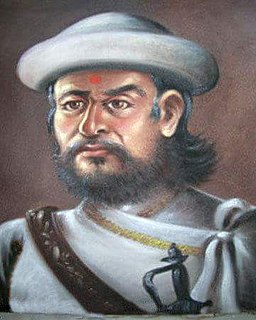
Abhiman Singh Basnet/Basnyat was first Commander-in-Chief of Unified Nepal. Abhiman Singh became the first Commander in Chief of a United Nepal after General Kalu Pande died during his second attempt to capture Kirtipur.

Hem Bahadur Singh is a retired chief of Nepal Police. He is the last I.G.P. to wear "Khaki" uniform. It was during his tenure as a police chief that the People's Movement I had occurred. Hem Bahadur Singh succeeded DB Lama as the police chief. Ratna Shumsher J.B.R. succeeded him as the chief of Nepal Police.
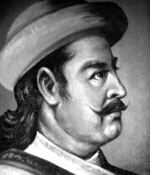
Nain Singh Thapa or Nayan Singh Thapa was a Nepalese Kaji (minister) and a military general. He died in the offensive campaign of Kangra from bullet injury. He was the owner of Thapathali Durbar.
Bakhtawar Singh Thapa also spelled Bhaktawar, was a Nepalese military commander, politician, and governor. He acted as an aide of his brother Mukhtiyar Bhimsen Thapa and was appointed the commander of Samar Jung Company. He commanded the Bijayapur-Sindhuli Gadhi Axis in the first campaign of Anglo-Nepalese War and Makwanpur Gadhi Axis in the second campaign. Later, he became the governor of Palpa and died in the office.

Ranadhoj Singh Thapa or Ranadhwaj Singh Thapa was deputy Prime Minister of Nepal during the administration of Prime Minister Bhimsen Thapa. He was the eldest son of Bada Kazi Amar Singh Thapa, supreme commander of Western front. He was great grandson of Ranjai [of Sirhanchowk] and grandson of Bhim Sen known as Umrao Bagh Bhim Singh Thapa, who died in the battle of Palanchowk in 1759 AD. His father was member of Bagale Thapa clan. He had 4 brothers; Bhaktabir Singh, Narsingh, Ramdas and Ranjore Singh, all of whom were Kaji at some point. He was functioning deputy to Mukhtiyar during the well known Anglo-Nepalese war. Mukhtiyar Bhimsen Thapa had to share administrative authority with him. Thus, his family was the another influential Bagale Thapa family serving in the royal court with Bhimsen Thapa family, due to their consolidation of power in the central authority. He retired as Kaji of Nepal in the year 1831 A.D. His two sons, Ripu Mardan Thapa and Badal Singh Thapa, also retired as Kaji of Nepal.
Amar Singh Thapa, distinguished as Sanukaji Amar Singh Thapa was a Nepalese military commander, courtier, minister and regional administrator. He was born as the youngest son of one of the leading Gorkhali Bharadar Birabhadra Thapa. He led battles against many independent principalities in Nepal and a battle against Tibet. He was a Governor of Palpa and retained the post till his death in 1814.

Mulkaji was the position of head of executive of Kingdom of Nepal in the late 18th and early 19th centuries. It was equivalent to Prime Minister of Nepal. There were 5 Mulkajis appointed between 1785 and 1804.
Swarup Singh Karki or Swaroop Singh Karki, was a Nepalese politician, courtier, military commander and minister. He was popular for his singing prowess and court conspiracies. He was selected as Dewan in the reign of King Pratap Singh Shah and a significant politician in the regent rule of Queen Rajendra of Nepal. He was one of the most influential court politician in the rule of King Pratap Singh and Queen Rajendralaxmi others being his rival Bahadur Shah of Nepal and Vamsharaj Pande. Vamsharaj was his perceived career rival. His life and career ended when Prince Bahadur Shah was appointed as regent in 1785.
The Kunwar family or Kanwar family was a noble Chhetri family in the Gorkha Kingdom and the Kingdom of Nepal. Kunwars were linked to the Thapa dynasty and family of Amar Singh Thapa by marital lineages and, thus, to Pande dynasty through the Thapa dynasty. Two branches of the Kunwars; Ramakrishna and Jayakrishna, were formed with opposite political aspirations. Bal Narsingh Kunwar supported Mukhtiyar Bhimsen Thapa while Chandrabir Kunwar supported Bada Kaji Amar Singh Thapa due to their marital relations with those families. Later, the Ramakrishna section of the family established the Rana dynasty of Nepal and styled themselves as Rana while Jayakrishna section remained as Kunwars.
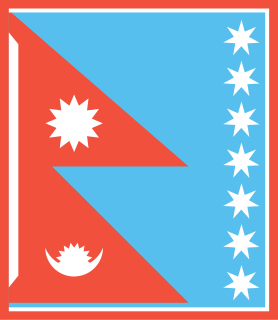
The family of Amar Singh Thapa was a noble Chhetri family in the central politics of Kingdom of Nepal as well as former military aristocratic family of Gorkha Kingdom. They were part of the larger Bagale Thapa clan who shared common lineage with the Thapa dynasty. The patriarch of this family was Ranjai Thapa, a member of Bagale Thapa clan and a distant relative of Birbhadra Thapa, grandfather of Bhimsen Thapa. Bagh Bhim Singh Thapa, a son of Ranjai, was a military commander of Gorkha Kingdom who was awarded the personal title of Bagh ("tiger"). Bhim Singh's son and the most prominent member of this family, Amar Singh Thapa went on to became overall commander of Kumaon, Garhwal and its West region in the Kingdom of Nepal. Amar Singh's sons and grandsons were influential Bharadars, politicians, ministers and military commanders in the Kingdom of Nepal.













